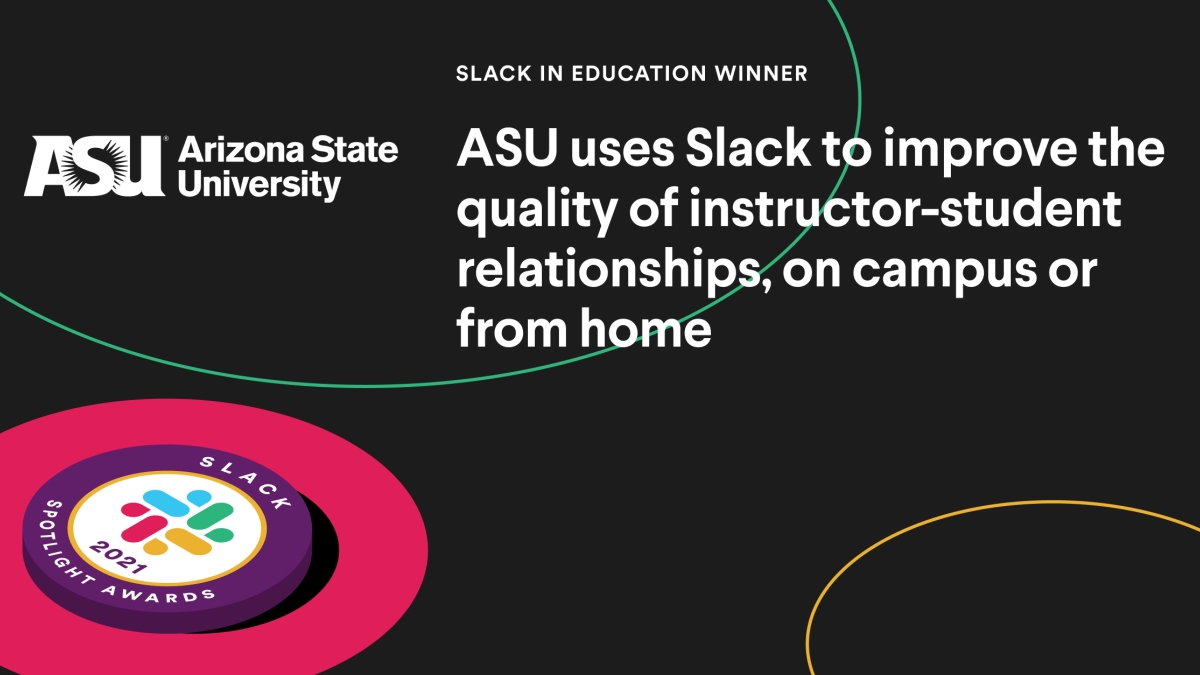Arizona State University has been honored with the Slack in Education Award, as part of Slack’s first-ever Spotlight Awards.
For its use of the real-time collaboration tool to redefine education and power the modern learning experience, ASU is being recognized by Slack as a forward-thinking university that sees the future of learning through the lens of new technology.
While Slack was used by different groups at ASU as early as 2014, it was officially adopted by ASU’s University Technology Office in 2017. Fast forward to 2019, and ASU has become the very first university to adopt Slack campuswide, rolling it out to five locations and 200,000 users, including students, faculty and administrators. Slack is used to host classroom discussions, develop new courses and support students — both on campus and at home.
Slack is a primary part of ASU Sync, the university’s new mixed learning modality that brings remote and physical environments together for students and instructors. In this way, it also serves as a “digital campus” for the university. Student success through ASU Sync is bundled within the ASU Digital Backpack, equipping students with future-self technologies for learning, creating and collaborating. The tool set also includes Zoom, Dropbox, G Suite and Adobe Creative Cloud.
ASU Instructor Rachel Balven’s use of Slack for her “Collaborative Team Skills” class is a perfect representation of the promise of the tool.
“The most important impact of using Slack is from the student perspective,” Balven said, who reported seeing more open communication when using Slack. “And that’s key for a collaborative class.”
Students have also been able to interact and make those crucial social connections outside of the classroom through Slack. Devil2Devil, the social platform that brings incoming first-year students together, found a new home on Slack in 2020.
“Easy login access, a mobile app and customizable channels for conversations made Slack appealing,” said Casey Thomas, associate director of digital engagement and public relations at Admission Services and Devil2Devil’s community manager since its inception.
The ASU Digital Backpack finds its counterpart for faculty and staff with the ASU Digital Briefcase, which contains the tools of the Digital Backpack in addition to ASU One Number, ServiceNow and Office 365. Slack is deployed from the Digital Briefcase to great effect as well.
When COVID-19 was first making remote learning into a necessity, three faculty members demonstrated how their embrace of a digital campus prepared them for a new modality.
“Slack is for people to come together, create a workspace and get work done,” said Matt Sopha, clinical assistant professor at the W. P. Carey School of Business.
 ASU’s place at the Slack Frontiers event also gave the opportunity for UTO leadership to speak to the innovation and collaboration conducted through the tool. ASU CIO Lev Gonick explained that it allows everyone to stay connected.
ASU’s place at the Slack Frontiers event also gave the opportunity for UTO leadership to speak to the innovation and collaboration conducted through the tool. ASU CIO Lev Gonick explained that it allows everyone to stay connected.
“It doesn’t matter whether you’re learning online, on the campus in the classroom or ASU Sync; they are all enabled by Slack,” Gonick said.
The expansive use of Slack is represented by some key data, with over 5,500 active course workspaces and 7,500 active users, alongside tens of thousands of messages sent daily. And UTO thrives with a number of team- and work-related channels across its entire Slack workspace. More than 16 key UTO Slack communities keep all of its family members informed and connected.
With ASU’s deployment of Slack, the university was able to create a space for everyone in its community to connect, an ability that became even more crucial in the days of COVID-19 and remote learning, instructing and work.
More Science and technology

Indigenous geneticists build unprecedented research community at ASU
When Krystal Tsosie (Diné) was an undergraduate at Arizona State University, there were no Indigenous faculty she could look to…

Pioneering professor of cultural evolution pens essays for leading academic journals
When Robert Boyd wrote his 1985 book “Culture and the Evolutionary Process,” cultural evolution was not considered a true…

Lucy's lasting legacy: Donald Johanson reflects on the discovery of a lifetime
Fifty years ago, in the dusty hills of Hadar, Ethiopia, a young paleoanthropologist, Donald Johanson, discovered what would…
